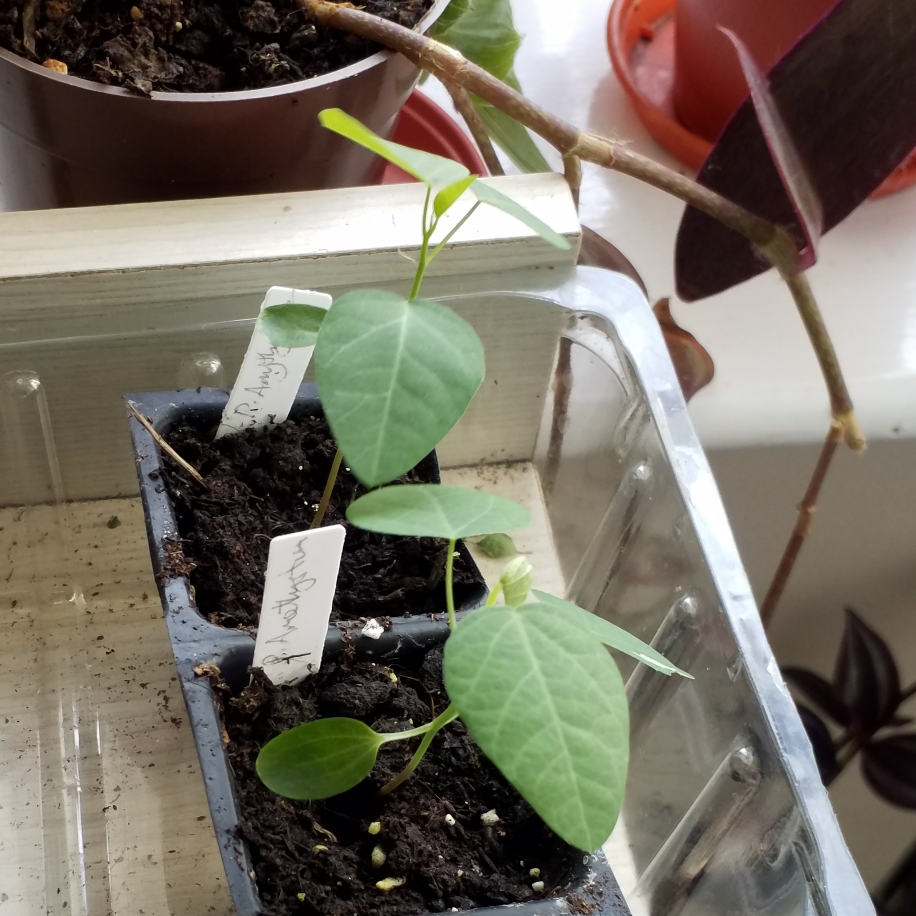
Passiflora 'Amethystina'
Passion Flower 'Amethystina'
Passiflora is a species of mostly tender climbing plants that are best given greenhouse treatment, although P. caerulea and P. umbellicata can be grown outside on trellis work or against walls in sheltered areas. They bear masses of intricately formed flowers surrounding a distinctive central crown (corona) of filaments. Inside the corona is a stem bearing the pollen filled stamens. After flowering a pollinated plant will bear fruit, known as passion fruit, which are edible. 'Amethystina' flowers have dark blue inner petals with a narrow concentric stripe of white and rich blue-purple tips, while the outer petals are a soft mauve colour, with lime green stigma and stamens
Contributed by @Sephy
-
Full sun
-
Occasional watering
-
A little frost hardy: 32F (0°C)
-
Moist and free draining
Common name
Passion Flower 'Amethystina'
Latin name
Passiflora 'Amethystina'
type
Climber
family
Passifloraceae
ph
5.6 - 7.8 Acid - Neutral
Plant & bloom calendar
-
Best time to plant
-
When the plant will bloom
full grown dimensions
 1.00 M
8.00 M
1.00 M
8.00 M
Passiflora 'Amethystina'
Passiflora is a species of mostly tender climbing plants that are best given greenhouse treatment, although P. caerulea and P. umbellicata can be grown outside on trellis work or against walls in sheltered areas. They bear masses of intricately formed flowers surrounding a distinctive central crown (corona) of filaments. Inside the corona is a stem bearing the pollen filled stamens. After flowering a pollinated plant will bear fruit, known as passion fruit, which are edible. 'Amethystina' flowers have dark blue inner petals with a narrow concentric stripe of white and rich blue-purple tips, while the outer petals are a soft mauve colour, with lime green stigma and stamens
Flowering Season
From Mid Summer TO Late Autumn
Most varieties of passiflora flower between mid-summer and late autumn. Warm autumnal weather may prolong flowering of outdoor species.
Plant container plants
From Mid Spring TO Early Summer
Plant container plants in a sunny position, ideally in a greenhouse border or in a conservatory. Train them up strings or wires. Outdoor varieties can be planted in containers or directly into well drained soil in a sunny position, preferably sheltered by a wall. All types need support.
Propagation by Semi Hardwood Cuttings
From Mid Summer TO Mid Summer
Semi hard wood cuttings are taken from the current years growth from late summer to mid autumn the bottom of the cuttings is hard and soft on the top. With a sharp knife take a cutting of about 14 cms, remove lowest leaves, dip end into rooting hormone, and place round the edge of a pot filled with a suitable compost, water well, they must remain moist till rooted, place under glass but in semi shade.
Propagation by Seed
From Mid Spring TO Mid Spring
Fill a seed tray with seed compost,water and allow to drain. Sprinkle seeds over the surface allowing roughly 25mm space between seeds and cover with a thin layer of compost. Put tray in a clear polythene bag and place on a windowsill. When seedlings show remove plastic bag. When the second pair of leaves appear on the seedlings thin out to 50mm spacing by removing the weakest looking plants. After 2 or 3 weeks and when danger of frost has passed plants can then be planted outside into required position.








